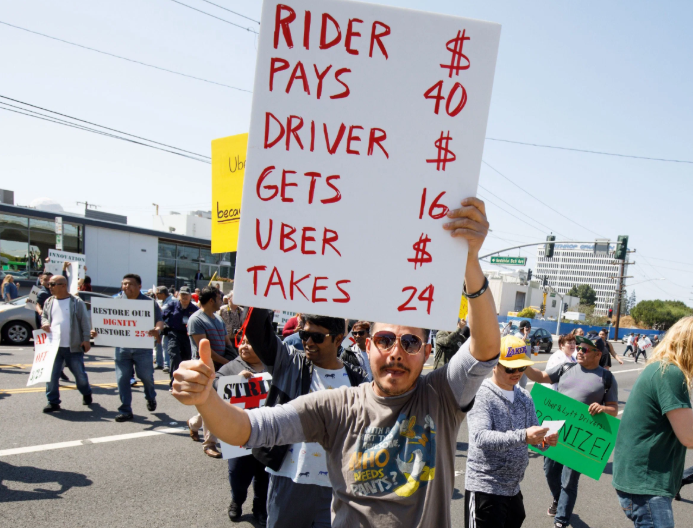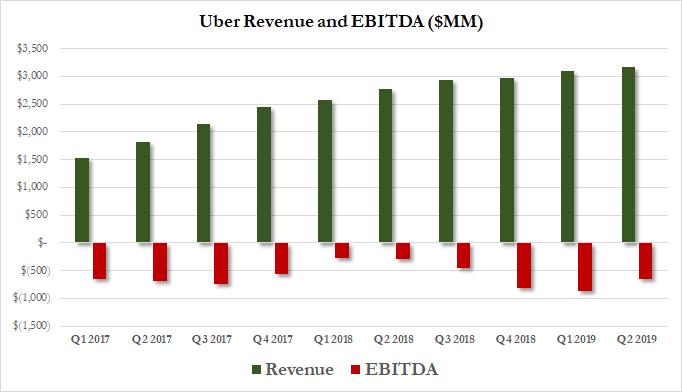New California “Gig Economy” Law Could Crush Uber’s Already Wildly Unprofitable Business Model
Uber, which posted an astounding $5 billion loss in its earnings report in August, looks like it may not be heading closer to profitability anytime soon (big surprise) – especially if California has anything to say about it.
California could be the first state set to disrupt Uber’s business model “gravy train” of essentially being able to use drivers as employees, but classifying them as independent contractors, according to Bloomberg. It’s a move that could significantly disrupt the ride-sharing company’s business model and, because of that, is prompting a legal response from Uber.
What does that rock solid legal response look like? Uber is arguing that driving isn’t its core business.
In California, lawmakers are seeking to reclassify workers that are treated as independent contractors. The move could wind up “dramatically” boosting costs for Uber and other companies built around the “gig economy”. The bill, Assembly Bill 5, would require that many workers be provided a minimum wage, mileage reimbursement and workers compensation. The California senate approved the bill on Tuesday. It now goes back to the Assembly before being sent to the governor for his signature.
The bill has the support of Governor Gavin Newsom who, along with supporters, says that it will finally provide contract workers what they are owed. Uber, and those similarly situated, say that if the bill becomes law, it may not meaningfully change their business model because there would still be questions about which workers qualify.
Tony West, Uber’s general counsel said:
“AB 5 doesn’t all of a sudden — magic wand — change everybody’s status to employee. Instead, new criteria would be used to determine whether workers are employees or contractors. Now, whether or not we win under that test in California remains to be seen.”
No it doesn’t, Tony. The company would almost certainly not “win” from this type of regulation.
Echoing our sentiments are skeptics of the company, who believe Uber may be too optimistic. The company has been able to get out of classifying independent contractors as employees by using litigation and settlements thus far. But AB 5 could pose a significant risk to the company and, even more terrifying for Uber, could also pave the way for other parts of the United States to do the same.
Jason Lohr, an employment lawyer in Uber’s hometown of San Francisco said: “Uber is ‘whistling past the graveyard’ if it underestimates how much AB 5 would favor drivers. If Uber balks, it will be a bonanza for personal-injury attorneys because the company will be presumed negligent when a driver is injured — and on the hook for attorney’s fees for failing to provide coverage.”
Obviously, higher labor costs would mean significant price hikes for riders.
Tom White, an analyst at D.A. Davidson in New York said: “Some of the data we’ve seen suggests that in order for ride-sharing to be a suitable replacement for car ownership, prices have to come down, not go up. That part of the story gets eroded somewhat if Uber is forced to increase prices in a material way.”
He continued:
“The market generally anticipates there being a headline about AB 5 being signed. But I think there’s still some question as to whether that necessarily means that it’s enforced before the two sides hash something out.”
As AB 5 continued to gain support in Sacramento, Uber has argued that other industries – like hairdressers and travel agents – have been exempted from the law. There’s also a provision in the law that gives California’s attorney general or city attorneys the ability to prosecute companies and block their operations if they mis-classify employees. Uber has argued that this could result in companies being “arbitrarily targeted with lawsuits and injunctions”.
Uber is prepared to go to court if the bill wins final approval. Part of its argument will be that it is a technology platform, not a transportation company. The new law states that for drivers to be considered independent contractors they must perform work “outside the usual course” of the company’s business.
With the implementation of meal delivery, Uber is going to argue that instead of being a ride hailing company, it is “connecting individuals with a work opportunity.”
Uber’s general counsel hilariously argued: “When courts understand that, they realize that drivers are not involved in the usual core business of Uber — because Uber is a technology company that operates a marketplace.”
Tyler Durden
Thu, 09/12/2019 – 11:00
via ZeroHedge News https://ift.tt/2Q9lzBJ Tyler Durden

